Downhill (1927)
Directed by: Alfred Hitchcock
Written by: Eliot Stannard
Starring: Ian Hunter, Isabel Jeans, Ivor Novello, Robin Irvine
HCF REWIND NO.81. DOWNHILL [1927]
AVAILABLE ON DVD
RUNNING TIME: 82 mins
THE HITCHCOCK CAMEO: none
REVIEWED BY: Dr Lenera, Official HCF Critic
At an expensive English boarding school for boys, Roddy Berwick is School Captain and star rugby player. He and his best friend Tim are both seeing a waitress called Mabel, who invites them round to the sweet shop where she also works. Both young men dance with her but a few days later she accuses Roddy of [depending on your interpretation] theft or getting her pregnant. The culprit is actually Tim, but he cannot afford to be expelled because he needs to win a scholarship to attend Oxford University. Roddy takes the blame and is expelled, promising Tim that he will never reveal the truth. Disowned by his family, Roddy sets out to make his way in the wide world…..
After The Lodger, one would expect Hitchcock’s next few films to not come anywhere near it in quality, and so it is the case with Downhill, his fourth film as director [if you recall, The Mountain Eagle is lost, which is why I have been unable to review it!]. This very moralistic and rather unbelievable drama is quite enjoyable though, probably easier to watch for newcomers than The Pleasure Garden, and it’s crammed full of directorial quirks. You have to be careful which DVD you get, because some prints have jarring anachronistic music and some have no music at all, which was the case with mine. I had seen The Lodger before, so I didn’t mind too much viewing it without music, but Downhill was new to my eyes so I found it rather hard to get into for a while. After a while though, as long as you aren’t disturbed by too much in the way of external noises, you may find yourself being drawn into this melodramatic but rather interesting tale.
It was the stage that was always the main source of inspiration for British silent pictures, despite the irony of the plays being deprived of their very essence – the words! Downhill was based on a play written by Constance Collier and David Lestrange, which was actually a pseudonym for Ivor Novello, who of course had been The Lodger. More a series of sketches rather than a proper play, it was adapted by Hitchcock’s usual writer of the time Eliot Stannard into a more coherent piece, though still unavoidably episodic. Nonetheless Hitchcock seemed to be focused on the story and not just use it as an excuse for experimentation though you’d be forgiven for thinking that he did upon watching it. By now not only The Lodger but The Pleasure Garden had been released to great success and Hitchcock was suddenly a well-known name. Therefore Downhill only suffered minor alterations, ones which were made by Hitchcock himself who was given far more control over this film, and who had no trouble in getting it released. It was another critical and commercial hit, though some were disappointed that it was not another suspense thriller.
Hitchcock added opening titles to the film saying; Here is a world of two school boys who made a pact of loyalty. One of them kept it – at a price. Then, curiously, we have one of three ‘chapter headings’ in the film, The World Of Youth. Later on, we will get to The World Of Make Believe and The World Of Lost Illusions. The early scenes convincingly capture the look and atmosphere of a traditional boy’s school, especially a great little diversion of a scene when two boys are having a rather brutal fight. Then…..well, as indicated by the first paragraph of this review, it’s unclear what happens. Roddy and Tim visit the girl they both seem to be seeing, and one wonders if they see her together in an even more intimate way that we see. Is this the mischevious and downright dirty Hitchcock, getting daring things past the censor again, this time it being a ménage a trios? Yes or no, we have an odd sequence when both men dance with Mabel in turn mostly in shadow, and during Roddy’s dance with Mabel they look like they’re trying to strangle each other. Then, in the next scene, the men are summoned before the Schoolmaster, where Mabel has accused Roddy of….well….something.
It just isn’t specified, and more sources say it is theft, but the reactions of other people especially Roddy’s father seem to indicate that it’s more likely to be pregnancy, though I actually didn’t have a clue while I watched the film. Mabel is one character we are just not allowed to work out; is she is a tramp and a conniving cow [it’s obvious Roddy’s family have loads of money], or just someone having some harmless fun who makes a genuine mistake? Annette Benson acts the part with surprising subtlety and never gives anything away. She virtually disappears after the first third though as we follow Roddy’s adventures in Paris, first as a show performer who marries a famous actress and wastes all their money including a huge sum coming from an inheritance, than as a paid dancer [and maybe gigolo] in a night. Roddy is an idiot and even rather unsympathetic as he ‘loses his way’, but realises the error of his ways towards the end. The story jumps forward too much at times, such as a bit near the end where we really want to see him drunk in a sewer rather than just being told he has been found that way, but it’s oddly compelling, though the happy ending seems false.
Even more than The Lodger, Hitchcock’s direction is astonishing. There are numerous point-of-view shots climaxing with an incredible series of them near the end when Roddy is disorientated being back in England and we not only have shots superimposed on each other but shakycam! Yes, the camera shakes all over the place! How innovative was Hitchcock? Transitional cuts move go from certain objects to others that are very similar and almost look like dissolves, such as a watch becoming a clock. Other clever shots include a bit where Roddy seems to be working as a waiter but a pullback reveals him to be playing a waiter in a show. A lengthy dream scene, which includes a very disconcerting shot of all the women in Roddy’s life playing a game at a table with his money, is shot in a ‘realistic’ manner, the way most dreams actually seem to the dreamer. Original prints had this scene tinted green. And then there’s my favourite, if cruellest, bit of the film near the end where Roddy is talking to a woman of ‘mature years’. She’s hardly a stunner but seems to have kept her looks, and her eyes look with great pity on Roddy as he tells his sad story. The scene is rather touching. Then suddenly, the curtains of the nightclub are pulled back and light streams in, revealing the woman to look very old and haggard indeed and emphasising the artificiality of the whole environment, after which we have a bleak punchline where we cut to a coffin being carried. Bits of Roddy going down escalators in lifts are symbolically obvious to the point of silliness though, and, while once again title cards are minimal in number, some of the lines are laughable.
Downhill has Hitchcock’s second ‘man accused of something he didn’t do’ [or even his first if you look at The Lodger in the way I do], and this time it’s for most of the film. Sadly 38 year old Novello in no way convinces as an 18 year old even though his performance is quite good – better actually than his one in The Lodger – and the actor does his best with such a miscast role. Hitchcock was dismissive of much of his silent work and probably had a point, but Downhill, though not really deserving of being reappraised as a classic, is a bit better than certainly I had expected, and even if you don’t buy into the melodrama, it’s certainly very interesting indeed to watch from a purely visual point of view.
Rating: 










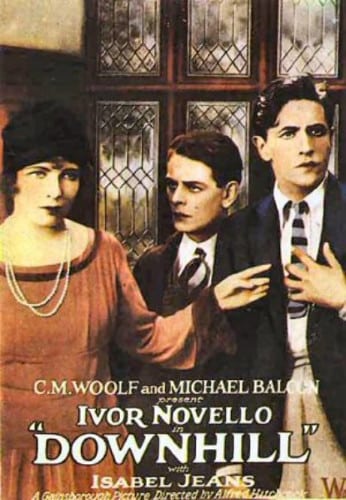
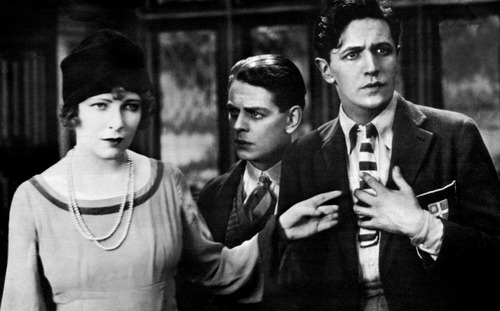


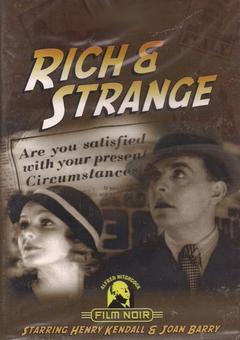
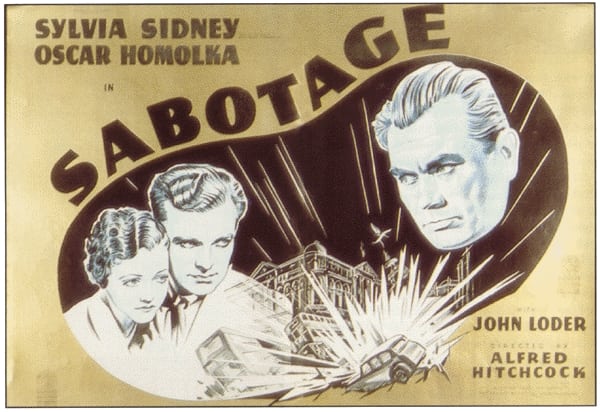
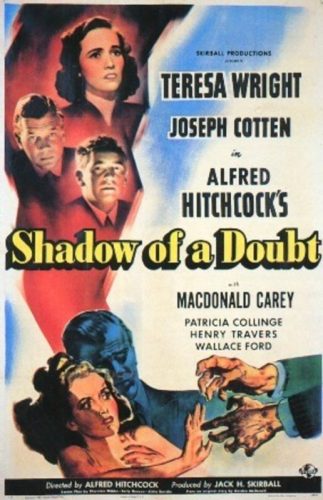
Be the first to comment